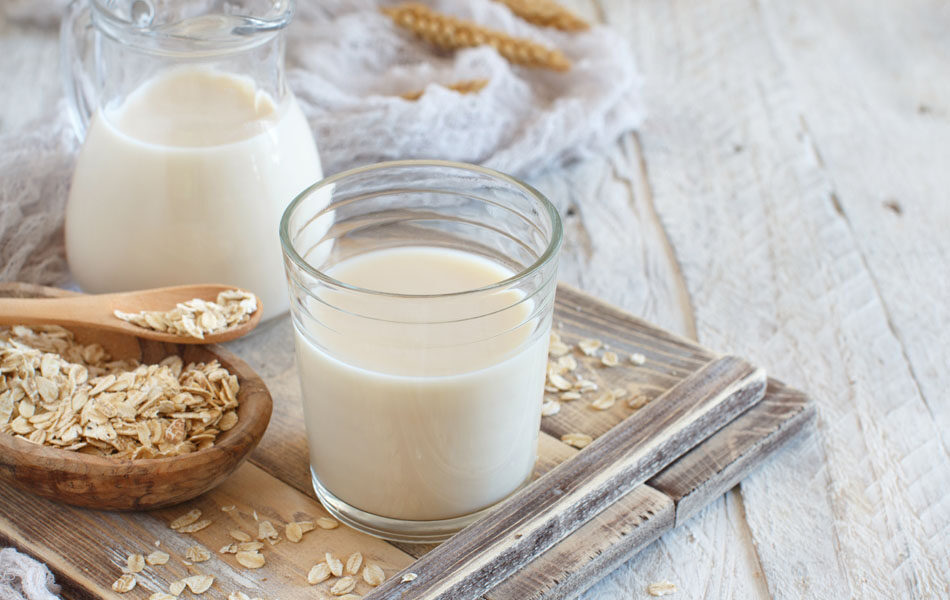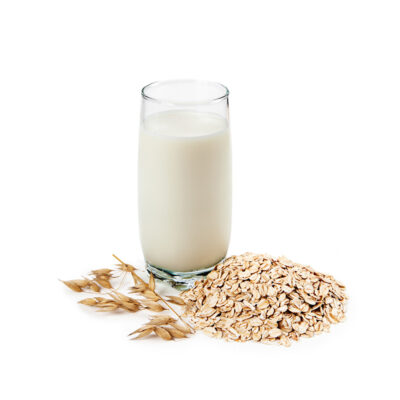Is Oat Milk Good for Diabetes? Reviewing the Popular Milk Alternative
If you prefer plant-based milk over cow’s milk, you’re probably wondering about the best options to fit your diabetes diet. As a popular alternative, we’re looking at oat milk and its nutritional profile to see if it makes a good match.

As plant-based and vegan diets are gaining popularity, many people are ditching cow’s milk in favor of alternative milk options. Oat milk stands out as a firm favorite among the likes of coconut, soy, and almond milk. It has a creamy texture and a slight sweetness that people love, especially in coffee.
For people with diabetes, finding the right non-dairy milk is a little more challenging. The best type depends on factors like the nutritional profile, GI rating, total daily carbs, and personal preference. With all of the latter information, you can make an informed choice.
In this article, you can learn if oat milk is a good match for a diabetes diet plan.
Is Oat Milk Good for Diabetes?
Oat milk is not the best plant milk for people with diabetes. While it is generally considered a healthy choice overall, it has a moderate glycemic index (GI) higher than other alternatives. Although made from oats, which are good for diabetes because they have a low GI score, oat milk contains maltose – a super sugar with a high GI. Maltose occurs naturally during the production process and can quickly raise blood sugar levels.
Furthermore, oat milk has a high carbohydrate content. Consuming too many carbohydrates can cause high blood sugar in people with diabetes. Oat milk is not keto-friendly and must be avoided if you try the keto diet for diabetes under medical supervision.
Oat milk isn’t completely off-limits. In moderation, it may have some positive health benefits for those with diabetes. For example, oat milk is good for weight loss because it is low in fat and relatively low in calories. Losing excess weight is vital for type 2 diabetes management.
Talk to your doctor before including oat milk in your diet.
Does Oat Milk Raise Blood Sugar Levels?
Consuming oat milk can raise your blood sugar because it contains a type of natural sugar called maltose. Maltose is a high-glycemic sugar that spikes blood sugars faster than other types of carbs. Even unsweetened oat milk still contains sugars that can affect blood glucose.
That said, oat milk contains dietary fiber, which is a great carb for diabetes management. It helps control blood sugar because the body doesn’t break it down like other carbohydrates. Additionally, oat milk tends to have more protein and dietary fiber than other plant milk.
While the fiber content can help regulate blood glucose, people with diabetes should consider the drawbacks of consuming maltose.
Nutritional Value of Oat Milk (Unsweetened)
Most people can include oat milk in a healthy diet. Oat milk has carbohydrates, protein, fiber, and other nutrients, such as calcium, magnesium, potassium, and vitamin D. It has several health benefits. Still, as previously discussed, it may not be the best for diabetes.
The below table shows the nutritional profile of unsweetened oat milk per 100g.

Glycemic Index of Oat Milk
Oat milk has a GI rating of 66. Based on the index categories, this gives oat milk a medium score. The number is based on how much impact a food item has on blood glucose levels. So, the rating of 66 means oat milk will have a moderate effect on raising your blood sugar.
Any food or drink with a ranking of 70 or higher is considered a high-GI score. When you consume these items, they can cause rapid blood sugar spikes. Those with type 2 diabetes can benefit from choosing low-GI foods to keep blood glucose under control in the long term.
Is Oat Milk Better Than Dairy Milk for Diabetes?
A person with diabetes can drink oat milk and dairy milk. It is unclear which milk is the better choice, as each has its advantages and drawbacks. The best milk or milk substitute for people with diabetes is the one with the least amount of sugar and unhealthy saturated fat.
Based on that factor alone, it’s vital to note that a cup of oat milk has less sugar than its dairy counterpart. However, whole cow’s milk falls into the low glycemic food category, which makes it less likely to cause nasty blood glucose spikes.
The key nutritional difference is that the animal-based variety does not contain fiber. Oat milk, on the other hand, has around 2 grams per cup as it is made from oats. Fiber is an excellent nutrient for diabetes management because it aids blood sugar control.
Furthermore, oat milk is generally low in protein, while whole cow’s milk has a fair amount, with 8 grams in one cup. Oat milk and whole milk have a similar amount of carbs, but oat milk has less fat and calories. These are essential factors to monitor if you are trying to lose weight.
Oat milk is naturally low in calcium, whereas milk is naturally rich with 300mg. Calcium intake is linked to a reduced risk of type 2 diabetes. Fortunately, most store-bought oat milk is fortified with calcium, as well as iron, potassium, fiber, and vitamins A and D.
A Word From a Nutritionist
Oat milk is popular for a good reason. It has a great taste that works well with tea, coffee, cereals, and more. This drink is made from nutrient-dense oats, making oat milk a rich source of nutrients. When oat milk is fortified, it has even more vitamins and minerals.
As oat milk is a tasty milk substitute, it fits perfectly into a plant-based diet. You can add it to various recipes and meals in place of regular milk. Plant-based diets are great for diabetes management. It can help improve BMI, lower cholesterol levels, and aid weight loss.
It’s also a healthy choice for people who have lactose intolerance. While oat milk can help support a weight loss journey and provide your body with fiber and other macro and micronutrients, it does contain maltose which can rapidly raise blood glucose levels.
Some varieties also have added sugars. You could always make your own oat milk to control the ingredients. If you want a different plant-based alternative, you could try almond milk, which is good for diabetes. Another choice suitable in moderation is coconut milk.
Weight maintenance is necessary with diabetes. If you are trying to shed a few pounds, there are different types of milk that are great when trying to lose weight. When shopping for plant-based milk, always check the label and opt for products lower in fat and without artificial sweeteners or additives.
Conclusion
Oat milk and diabetes – is it a match?
Oat milk is a low-protein, low-fat, dairy-free product with a small amount of fiber. It can aid in weight loss and provide nutrients to benefit your overall health. However, as it contains maltose, it might not be the most fantastic milk replacement available on the market.
A healthy diabetes meal plan is rich in fruits, vegetables, lean protein, and fiber. It is low in calories and saturated and trans fats. If you are unsure how oat milk can fit into your eating program, consult your doctor or nutritionist for advice on the best milk for your dietary needs.

















































 Select your language:
Select your language: 








